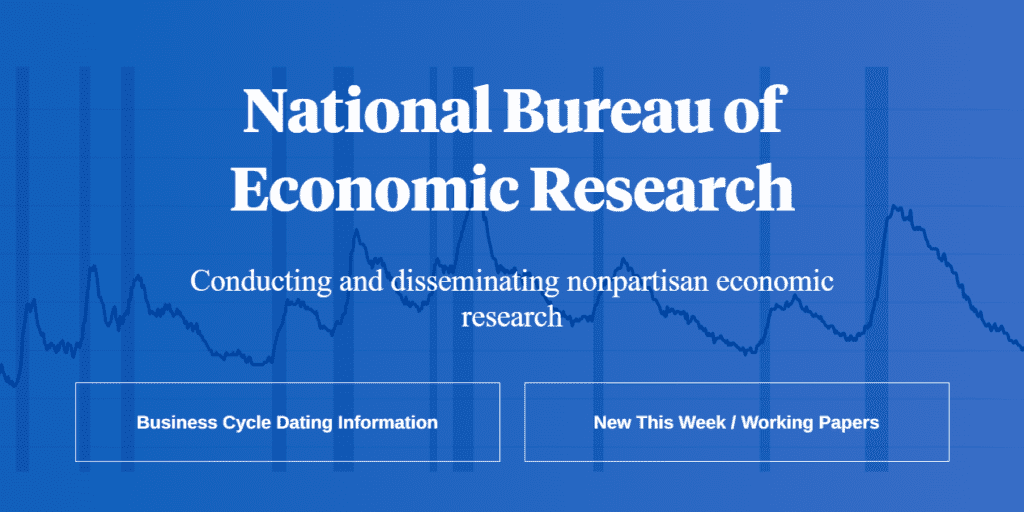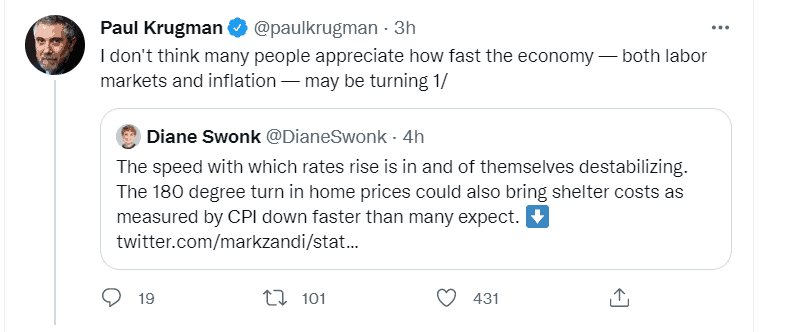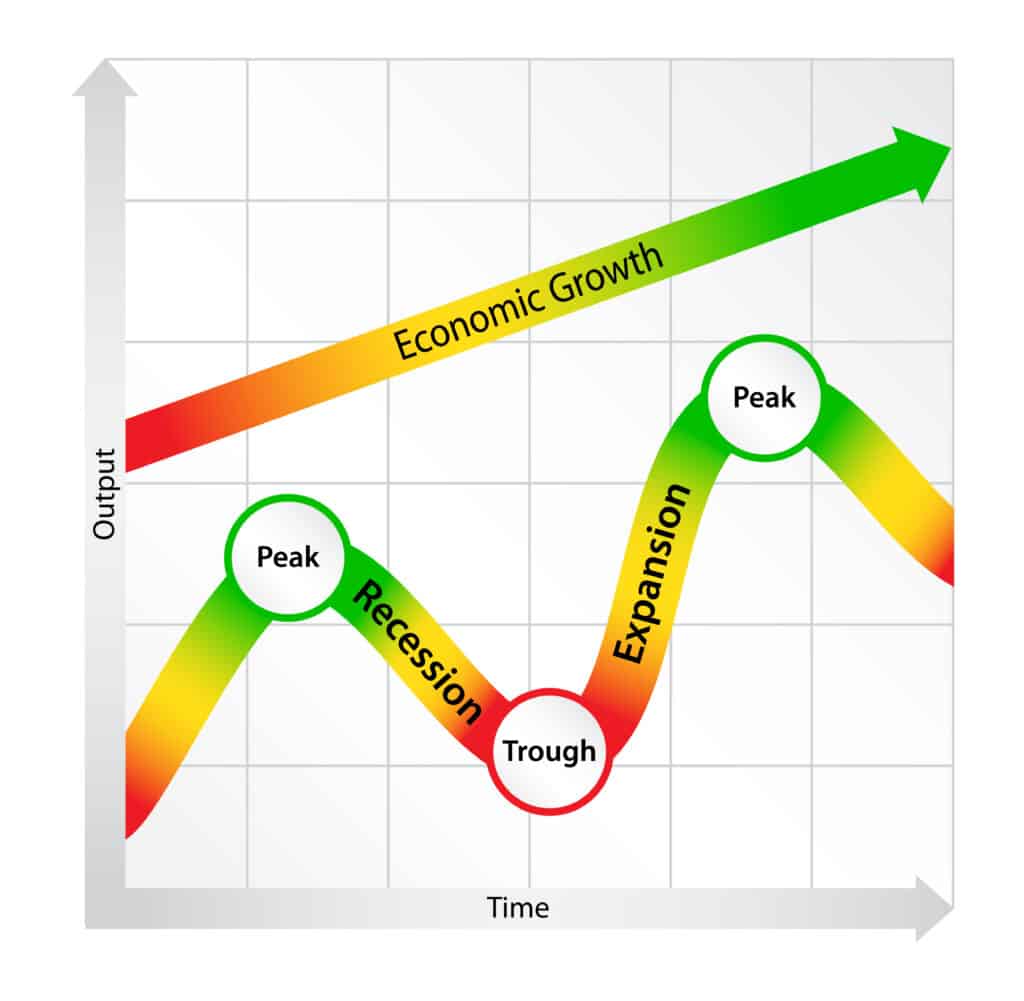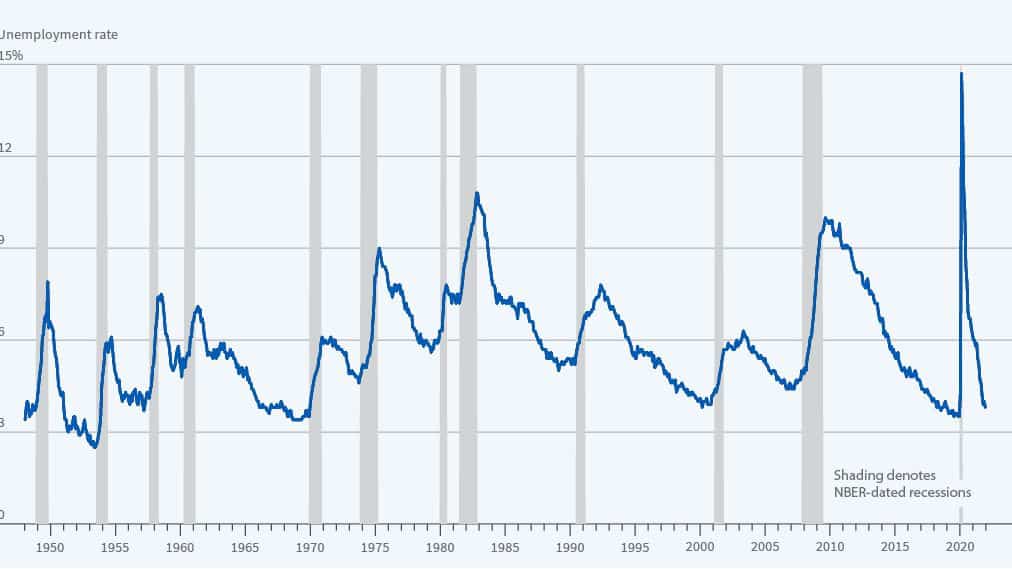
Recession-Proofing Your Business: What Is an Economic Recession?

The past few years have seen a series of economic ebbs and flows, leaving business owners and consumers wondering what the future may hold. An economic recession refers to a trend of decline in employment and production in the business cycle. The initial losses cause further reductions in household spending, resulting in a decrease in the overall gross domestic product.
Many experts don’t agree on a specific term length of economic loss required before declaring a recession, which is why the question is constantly up in the air. As a point of reference, the National Bureau of Economic Research, an organization dedicated to tracking and defining business cycles, defines a recession as a period of economic decline lasting more than a few months. Other entities and experts argue that a recession occurs after two consecutive quarters of negative GDP.

Regardless of the definition, an economic recession represents a time of significant financial challenges for businesses. Consumers restrict spending habits because of higher unemployment rates, and companies cut costs to subvert potential market loss. If you’re not concerned about these financially risky outcomes, it’s time to sound the alarm.
Surviving a recession is about making strategic decisions to increase visibility and market share. Your decisions depend on the ability to predict future crises and invest in appropriate channels. You can be prepared for an economic recession, but it takes a little knowledge and recession-proofing.
Is a 2022 Economic Recession Possible?
Between inflation, supply chain disruptions, and Federal interest rate hikes, consumers and business owners are rightfully concerned about the possibility of an economic downturn. Despite the concerns, some economists argue the economy is yet too healthy to fall into a crisis.
But even if economists feel optimistic, business owners cannot wait to prepare for the next recession. Now is the time to focus on proactive decision-making.

Why You Should Avoid Reactive Recession Thinking
If you want to remain ahead of any potential financial crises, you need to avoid reactive decision-making. Common reactions to financial crises include drastic cost-cutting, which can motivate irrational decisions like divesting core products and services.
Your focus is to remain in financial control, even when times get tough. Some exigent events demand a reactive approach, such as the arrival of new competitors or the development of new technology. However, recessions are not unknown variables. Many economists consider economic downturns as inevitable features of the existing economic model, which depends on the ebbs and flows of the financial cycle.

However, failing to see an economic recession as a possibility forces a firm into an inevitable game of catchup and reactive reasoning. A business must plan for worst-case scenarios to thrive during a financial crisis.
How To Be Proactive in an Economic Recession
As a company, you must consider the paradoxical relationship between capitalizing on processes, products, and services to maintain market share, while maintaining assets and operations during worst-case scenarios.
Proactive decision-making involves anticipating future challenges and developing protective strategies to maintain profitability during those times. A recession is a predictable issue. While professionals cannot predict the exact dates of financial crises, history dictates their certainty.

Investopedia’s History of Recessions
The primary defensive strategy for businesses is pre-recession planning and surgical restructuring. This strategy prepares you for when an economic recession occurs, but it is also a great way to secure and double down on processes that will allow you to thrive in any economic phase. Keep in mind that only the companies that foresee potential crises and develop actionable strategies for survival will avoid the stress and panic of a recession.
Create An Actionable Blogging Strategy
Pre-Recession Planning and Business Success
Pre-recession planning is the process of thinking ahead and finding your strengths and weaknesses as a business. This type of planning is essential for every company, regardless of size. The plan should help you identify your defensible positions, offensive strategies, investment opportunities and core strengths.

Defense during an economic crisis is about balancing the books. A business should take a restrictive approach to expenditures, identifying areas of wasteful spending and processes. During an economic recession, a company should limit the production of non-core products to favor core items and services.
A solid offensive strategy includes investing in marketing, talent and core products. While it may seem intimidating, focusing a budget on promotion, products and growth is common among businesses that thrive during financial downturns.
Investment strategies are a critical aspect of corporate survival during a recession. Businesses must invest capital into worthy assets, such as:
- Marketing Channels
- Consumer Relationships
- Research and Development (R&D)
Finally, a company maximizes its processes and potential visibility in the marketplace by investing in core strengths and divesting non-essential operations or services.
Surgical Restructuring to Maintain Corporate Muscle
Surgical restructuring is the goal of pre-recession planning. The proactive approach to redistributing budgetary dollars and maintaining market dominance includes:
- Managing capital and investments
- Investing in R&D and high-value assets
- Realigning logistical and production goals
- Improving consumer relationships
- Maintaining and improving marketing efforts and campaigns
Why You Need To Focus on Marketing During an Economic Recession
Too many businesses decide to cut marketing budgets when the economy declines. The consensus among well-meaning executives is that sacrificing advertising dollars will allow them to focus on operations without sacrificing market share — research does not support this claim.
A company’s market share depends on its relevance to consumers. Customers rely on consistent communication from brands they admire, especially during financial turmoil. If a company cuts its marketing budget, restricting its ability to communicate with loyal consumers, it is showing a disregard for the relationship, and customers will go elsewhere.

Sustained communication is crucial during an economic recession. Thankfully, companies can save money during challenging financial times by investing in the proper marketing channels.
Content Marketing Saves Money
When discussing marketing and a value-add strategy, we urge companies to consider content marketing and the unparalleled benefits of blogging. Content strategies provide businesses with a sustainable, evergreen and profitable marketing vehicle during economic downturns.
Typical digital marketing assets, while valuable, experience several common challenges, including ad blockers. Content development focuses on developing relevant, consumer-targeted informative blogs that inform customers and persuades them to buy products. In fact, companies using content marketing strategies experience over seven times more traffic than those that don’t.
Beyond the effectiveness of content marketing, a business spends 62% less on content development than on outbound marketing. The result of the savings is a conversion rate six times higher than competitors who ignore content strategy. During an economic recession, a business cannot afford to sacrifice market share; content marketing can keep that from happening.
Content Marketing Improves Consumer Loyalty
Content marketing helps brands develop consumer loyalty and resilience by establishing a reputation of authority and relevance. Despite the plethora of communication techniques available to businesses, content creation remains the most effective.

Content development is an opportunity for brands to show authority and to prove to the customer they hold value. A content strategy aims to reach consumers where they are by answering common questions or providing valuable and relevant information.
With the proper techniques, you can foster consumer relationships and develop a quality reputation with content marketing. Experts suggest that content development relies on six critical pillars:
- Research (insights, reports, studies, etc.)
- Consumer FAQs
- Social media
- Consumer interactions (case studies, testimonials, reviews)
- Collaboration
- Subject matter experts (SMEs)
However, along with these pillars, it is important to understand the uses of SEO, high-quality writing and strategic persuasion. That’s where we come in, offering the best quality content catered to your marketing needs.
We Write Content: That's Literally All We Do.
Wrap Up: Should You Recession-Proof Your Business With Content Marketing?
Is an economic recession coming? Economists seem optimistic about the economy’s current health, but many issues, such as inflation and supply chain disruptions, point to a possible recession. Regardless of the inevitability of a future recession, companies need to take a proactive approach to potential crises by refocusing their budgets and optimizing marketing dollars.
Content marketing provides a cost-effective and lucrative marketing channel. Content development allows brands to establish authoritative reputations and long-term consumer relationships. With guidance from expert services, a business can maximize its marketing budget, allowing it to survive and even thrive during an economic recession. Sign up for our monthly SEO blog writing service to experience more traffic, leads, and sales.
- 20 Business Blogging Statistics That Will Blow Your Mind - May 28, 2023
- Where To Find SEO Writers for Hire - May 20, 2023
- 16 Statistics On How Blogging Gives Your Business a Competitive Advantage - May 11, 2023


